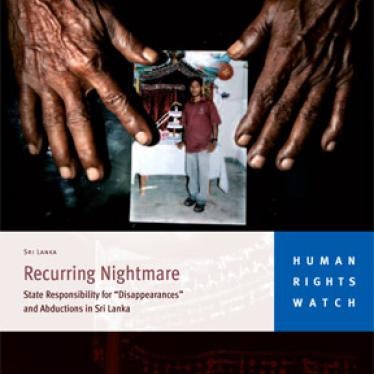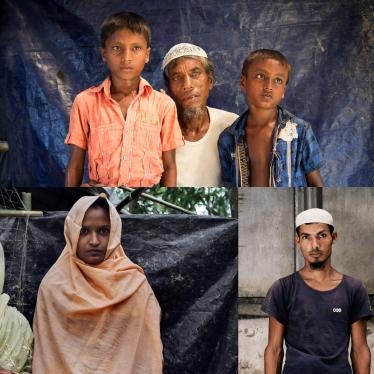(New York) - The Sri Lankan government's announcement that it was ending its special inquiry into conflict-related abuses underscores the need for an international commission to investigate violations of international law by government forces and the Liberation Tigers of Tamil Eelam, Human Rights Watch said today.
"Sri Lanka's presidential commission of inquiry started with a bang and ended with a whimper," said Elaine Pearson, deputy Asia director at Human Rights Watch. "The need for an international inquiry into abuses by both sides is greater than ever."
The mandate of the Presidential Commission of Inquiry, which was established in 2006 and assigned to investigate 16 incidents of killings, enforced disappearances, assassinations and other serious abuses, expired on June 14, 2009 and reportedly was not renewed. Although the commission's chairman, former Supreme Court chief justice Nissanka Udalagama, said that seven of the 16 cases had been investigated, none of the commission's reports have been released or any other public action taken. Among the cases the commission investigated was the brutal killing of five students in Trincomalee, the summary execution of 17 aid workers in Mutur, and the bomb attack that killed 68 bus passengers in Kebitigollewa. Human Rights Watch has expressed concern about the slow pace of the investigations and President Mahinda Rajapaksa's unwillingness to release the investigation reports.
The last weeks of the war heightened the need for an independent and impartial inquiry. Fighting in northeastern Sri Lanka intensified from early January until the government's defeat of the LTTE in May. During that period, both sides were implicated in numerous serious violations of the laws of war. LTTE forces used displaced persons as "human shields," and fired on civilians who tried to flee the conflict area. Government forces repeatedly fired heavy artillery into densely populated areas, including at hospitals caring for the wounded.
During the special session on Sri Lanka of the UN Human Rights Council in May, the UN high commissioner for human rights, Navi Pillay, said that an "independent and credible international investigation into recent events should be dispatched to ascertain the occurrence, nature and scale of violations of international human rights and international humanitarian law, as well as specific responsibilities."
On May 23, Rajapaksa and the UN secretary-general, Ban Ki-moon, issued a joint statement from Sri Lanka in which the government said it "will take measures to address" the need for an accountability process for violations of international humanitarian and human rights law.
"The decision to disband the presidential commission shows that President Rajapaksa has little intention of fulfilling his promise to Secretary-General Ban," said Pearson. "It's now up to concerned governments to step in and ensure that justice is done for the victims of abuses in Sri Lanka's long war."
There have been serious ongoing violations of human rights in Sri Lanka and a backlog of cases of enforced disappearance and unlawful killings that run to the tens of thousands, as described for example in the 2008 Human Rights Watch report "Recurring Nightmare." Despite this track record, there have been only a small number of prosecutions.
Human Rights Watch said the presidential commission of inquiry was just the latest inadequate and incomplete effort by the Sri Lankan government to investigate serious human rights abuses and bring those responsible to justice. Other efforts to address violations through the establishment of ad hoc mechanisms in Sri Lanka produced few results, either in providing information or leading to prosecutions.







